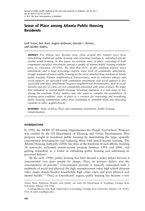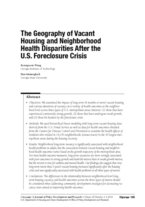0
Research
Community:
Mar 28, 2019
Federal safety net programs are intended to protect the most vulnerable Americans—such as the elderly, people with severe disabilities and young children. Housing assistance plays a critical role in the safety net, providing decent, safe, and affordable housing for millions of extremely low-income and vulnerable families—though, because it is not an entitlement like other federal safety net programs, the assistance available falls far short of the need. Housing subsidies free families to spend on other essentials like healthy food, education, and health care.
Authored by: Susan J. Popkin for Journal of Housing & Community Development
Topics: Asset building, Dual-generation, Education, Housing, Mental health, Mobility, Partnerships, Research, Workforce development
 Shared by Housing Is
Shared by Housing Is
Housing Is posted a
on Apr 2, 2019
Susan J. Popkin for Journal of Housing & Community Development
Federal safety net programs are intended to protect the most vulnerable Americans—such as the elderly, people with severe disabilities and young children.
0
Research
Community:
Jan 31, 2019
Because mental health conditions can negatively affect employment, people with these conditions make up a large share of federal disability program participants. Federal agencies have tested supported employment (SE) interventions designed to help those with mental health conditions keep or obtain employment and reduce their dependence on public programs. This brief describes the characteristics of adults with mental health conditions who participate in the federal disability programs and reports evidence from three recent studies of longer-term impacts of SE on the employment of people with mental health conditions. The findings indicate that, although a large share of disability program participants with mental health conditions report that they want to work, many face barriers, including being discouraged by failed past work attempts.
Authored by: Mathematica Policy Research
Topics: Asset building, Disabilities, Mental health, Research, Workforce development
 Shared by Housing Is
Shared by Housing Is
Housing Is posted a
on Mar 18, 2019
Mathematica Policy Research
Because mental health conditions can negatively affect employment, people with these conditions make up a large share of federal disability program participants.
0
News Article
Community:
Feb 5, 2019
We beef up law enforcement to attack crime, devote more funding to try and improve inadequate schools and tackle health disparities by getting more people to the doctor. But what if Baltimore could solve all of its persistent social problems by getting rid of poverty?
Authored by: Baltimore Sun Editorial Board for The Baltimore Sun
Topics: Asset building, Criminal justice, Funding, Health, Legislation & Policy, Low-income, Mental health
 Shared by Housing Is
Shared by Housing Is
Housing Is posted a
on Mar 11, 2019
Baltimore Sun Editorial Board for The Baltimore Sun
We beef up law enforcement to attack crime, devote more funding to try and improve inadequate schools and tackle health disparities by getting more people to the doctor. But what if Baltimore could solve all of its persistent social problems by getting rid of poverty?
0
Research
Community:
Aug 9, 2018
For almost two decades now, cities around the country have been demolishing traditional public housing and relocating residents to subsidized private market rental housing. In this paper, we examine sense of place, consisting of both community and place attachment, among a sample of Atlanta public housing residents prior to relocation.
Authored by:
Topics: Asset building, Housing, Legislation & Policy, Low-income, Mental health, Mobility, Research, South, Stability
 Shared by Housing Is
Shared by Housing Is
Housing Is posted a
on Aug 9, 2018
For almost two decades now, cities around the country have been demolishing traditional public housing and relocating residents to subsidized private market rental housing.
1
Research
Community:
Aug 1, 2018
We examined the impact of long-term (6 months or more) vacant housing and various durations of vacancy on a variety of health outcomes at the neighborhood level across three types of U.S. metropolitan areas (metros): (1) those that have experienced consistently strong growth, (2) those that have undergone weak growth, and (3) those hit hardest by the foreclosure crisis
Authored by:
Topics: Asset building, Asthma, Community development, Health, Housing, Low-income, Mental health, Metrics, Research, Safety, Transportation
 Shared by Housing Is
Shared by Housing Is
Housing Is posted a
on Aug 1, 2018
We examined the impact of long-term (6 months or more) vacant housing and various durations of vacancy on a variety of health outcomes at the neighborhood level across three types of U.S.
0
Publication
Community:
Jan 1, 2018
SAHF members believe that connecting residents of affordable housing with needed supports – such as educational resources or health services – can help vulnerable families and seniors achieve
a better quality of life. SAHF began the Outcomes Initiative to create a common framework for its members to demonstrate with data the impact on residents of providing housing-based services and support in the five key areas listed below.
Authored by: Stewards of Affordable Housing for the Future (SAHF)
Topics: Asset building, Cost effectiveness, Dual-generation, Education, Exercise, Food insecurity, Health, Housing, Mental health, Metrics, Nutrition, Safety, Stability
 Shared by Housing Is
Shared by Housing Is
Housing Is posted a
on Jul 26, 2018
Stewards of Affordable Housing for the Future (SAHF)
SAHF members believe that connecting residents of affordable housing with needed supports – such as educational resources or health services – can help vulnerable families and seniors achieve
a better quality of life.
 Shared by Housing Is
on Apr 2, 2019
Shared by Housing Is
on Apr 2, 2019
 Shared by Housing Is
on Mar 18, 2019
Shared by Housing Is
on Mar 18, 2019

 Shared by Housing Is
on Mar 11, 2019
Shared by Housing Is
on Mar 11, 2019

 Shared by Housing Is
on Aug 9, 2018
Shared by Housing Is
on Aug 9, 2018
 Shared by Housing Is
on Aug 1, 2018
Shared by Housing Is
on Aug 1, 2018
 Shared by Housing Is
on Jul 26, 2018
Shared by Housing Is
on Jul 26, 2018





